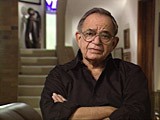You searched for: 2017谷歌play排名【TG飞机:@bapingseo】谷歌seo课程简介【TG电报:@bapingseo】南苏丹google开户【Telegram:@bapingseo】007篮球APP的下载e博娱乐官方网站?7tSqVg/H2bAcs.html
<< Previous | Displaying results 401-450 of 540 for "2017谷歌play排名【TG飞机:@bapingseo】谷歌seo课程简介【TG电报:@bapingseo】南苏丹google开户【Telegram:@bapingseo】007篮球APP的下载e博娱乐官方网站?7tSqVg/H2bAcs.html" | Next >>
-
The 45th Infantry Division during World War II
ArticleThe 45th Infantry Division participated in major WWII campaigns and is recognized for liberating the Dachau concentration camp in 1945.
-
Danuta Justyna
ID CardDanuta was born to Roman Catholic parents in the small industrial town of Piotrkow Trybunalski in central Poland. Her father and mother were school teachers. She and her younger sister, Maria, became friends with two Jewish girls, Sabina and Helena Szwarc. Although their houses were more than a mile apart, the girls often played together. 1933-39: Danuta was planning on attending college in September 1939, but on September 1 Germany invaded Poland. Four days later, German soldiers streamed into Danuta's…
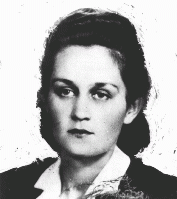
-
Maria Justyna
ID CardMaria was born to Roman Catholic parents in the industrial town of Piotrkow Trybunalski in central Poland. Her father and mother were school teachers. Maria attended grade school and secondary school in Piotrkow. She and her older sister, Danuta, became friends with two Jewish girls, Sabina and Helena Szwarc. Although their houses were more than a mile apart, the girls often played together. 1933-39: The Germans invaded Poland on September 1, 1939, and occupied Piotrkow four days later. Most schooling for…
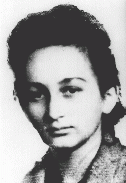
-
David Bayer
ID CardDavid was the second of four children born to religious Jewish parents in Kozienice, a town in southeastern Poland. His father, Manes, owned a shoe factory that supplied stores throughout the country. His mother, Sarah, took care of the home and children, and helped in the factory. Kozienice had a thriving Jewish community that constituted over half of the town's population. 1933–39: For most of the 1930s, David spent his days going to school, playing sports, and working in his father's shoe factory.…
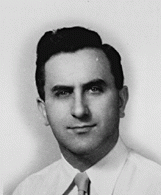
-
Gisella Renate Berg
ID CardGisella lived with her parents, grandparents, uncle, and older sister, Inge, in Lechenich, a small village outside of Cologne. The Bergs were an observant Jewish family. Gisella's grandfather was the president of the local synagogue association and her uncle was the cantor. Her father, Josef was a respected cattle dealer, who had many business and personal contacts with their Jewish and non-Jewish neighbors. 1933–39: Gisella was born several months after the Nazis came to power. Her parents feared for…
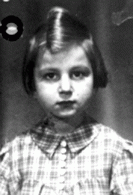
-
Kurt Pauly
ID CardKurt was born to Jewish parents in the city of Aachen, where his mother's family had resided since the 18th century. His father, though trained as a chef, worked as a butcher and also managed several stores for his father-in-law. The Paulys lived over one of those shops in the nearby suburb of Eilendorf. Kurt enjoyed large family gatherings, where he would play with his cousins, Anne and Margot Frank. 1933–39: When the Nazis came to power in 1933, the situation drastically changed for the Paulys.…
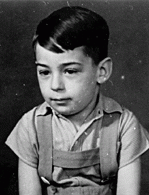
-
Susan Strauss
ID CardSusan grew up in Vacha, a small Thuringian town where her family had lived for more than 400 years. Her father, Herman, owned a general store and her mother, Bertha, took care of the home and children. Susan had a younger sister Brunhilde. The Strausses were one of about 25–30 Jewish families living in Vacha. 1933–39: Soon after the Nazis took power, many of Susan's friends stopped playing with her. In 1938 she was forced to leave the public school. That November, the Nazis unleashed a wave of pogroms…
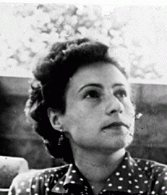
-
Barbara Marton
ID CardThe Martons were one of 35 Jewish families in the small northern Transylvanian town of Beliu. Barbara's father owned a grocery, and her mother helped out in the store. The Martons lived in a comfortable home with a flower garden, and enjoyed friendly relations with the townspeople. As a child, Barbara learned Hebrew on Sunday mornings at the home of Beliu's rabbi. 1933-39: Barbara's father's business began to fall off when another grocery opened nearby in Beliu. By 1937 business was so bad that they sold…
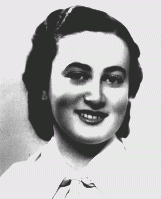
-
Emanuel (Manny) Mandel
ID CardManny was born to a religious Jewish family in the port city of Riga, Latvia. Shortly after Manny's birth, his father accepted a post as one of the four chief cantors in Budapest and the family returned to Hungary, where they had lived before 1933. Manny's father was based at the renowned Rombach Street synagogue. Between the wars, Budapest was an important Jewish center in Europe. 1933-39: Manny's father wouldn't let him have a bicycle. He thought someone might take it away from him because he was…
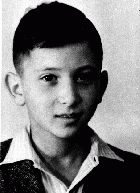
-
Urszula Kaczmarek
ID CardUrszula was one of four children born to Franciszek and Jadwiga Kaczmarek, who lived in the industrial city of Poznan in western Poland. The family lived at 11 Smolnej Street. Like their parents, the Kaczmarek children were baptized in the Roman Catholic faith. 1933-39: As one of the older children in the family, Urszula helped her mother with the housework. She was 10 years old when the Germans invaded Poland on Friday, September 1, 1939. German planes bombed Poznan that same day, and German troops…
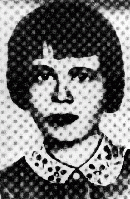
-
Maurits Wijnberg
ID CardMaurits was one of four children born to religious Jewish parents living in the town of Leek. When he was 12, the Wijnbergs moved to the town of Zwolle, where they ran a kosher hotel. That same year, Maurits became ill with meningitis. After he recovered, he worked hard to compensate for missed school and became an exceptional student. 1933-39: Along with his younger sister, Maurits was active in the local Zionist organization. One of the group's activities was raising money for Palestine [Yishuv]. Every…
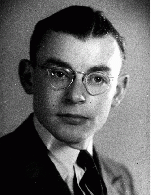
-
Marthijn Wijnberg
ID CardWhen Marthijn was 10, his religious Jewish family moved from Groningen to the town of Zwolle. There, his parents ran the only kosher hotel in the region. The Wijnbergs had two other sons and a daughter. All of the children attended Dutch public schools, and four afternoons a week they also went to religious school to study Jewish history, Hebrew and the Bible. 1933-39: Marthijn could play almost any instrument, including piano, saxophone and accordion. Sometimes each of his brothers would pick up an…
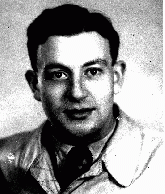
-
Catharina Soep
ID CardCatharina, called "Ina" by her family and friends, grew up in a religious Jewish household in Amsterdam. Ina's father, a successful diamond manufacturer, was president of the Amsterdam Jewish community. Ina had one brother, Benno, and a sister, Josette. 1933-39: On Sunday mornings and on Wednesdays after her classes at an Amsterdam Montessori school, Ina went to a private Jewish school where she studied Jewish history and Hebrew. Ina and her friends loved to meet in the evenings after they finished their…
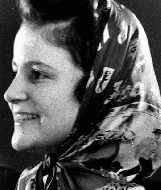
-
Mario Finzi
ID CardMario was the only child of a Jewish couple who were secondary school teachers in Bologna. Like many Italian Jews, his family was well-integrated into Italian society. Even though Fascist leader Benito Mussolini came to power in 1922, Jews in Italy continued to live in safety. Mario played piano as a hobby. When he finished high school in Bologna, Mario went on to study law. 1933-39: In 1938 Mario began practicing law in Milan. But later that year, Mussolini's government issued "racial" laws that…
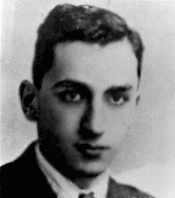
-
Andras Muhlrad
ID CardThe second of two children, Andras was born to Jewish parents living in a suburb of Budapest. His father was a pharmacist. The Muhlrads lived in a large house with Andras' grandfather and aunts. As a toddler, Andras often played with his older sister, Eva, and their cousins in the big yard behind their home. 1933-39: Andras was 4 when his family moved to their own apartment. It was 1936 when he began primary school and Hitler had already been in power in Nazi Germany for three years. At night his father…
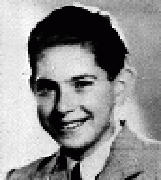
-
Malvin Katz Fried
ID CardMalvin and her eight brothers and sisters were born to religious Jewish parents in the small town of Buj in northeastern Hungary. The family later moved to the village of Zalkod, where Malvin's father ran a general store. The Katz family lived in a sprawling farmhouse with a large garden and fruit orchards. Malvin married Sandor Fried, the brother of her sister Sadie's husband, Hermon. 1933-39: Malvin's oldest sister, Sadie, who immigrated to the United States many years ago, has come home for a visit.…
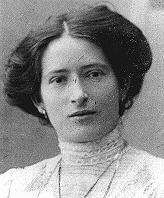
-
Edith Fuhrmann Brandmann
ID CardEdith's village of Kriesciatik was located on the border between Romania and Poland. Her Jewish parents owned a large ranch where they raised cattle and grew sugar beets. They also owned a grocery store. Edith had a brother, Jacob, and a sister, Martha. At home the family spoke Yiddish and German, and Edith learned Romanian after she began school. 1933-39: Edith's village was by a river, and she spent summer days by the water with her friends, swimming and playing. Her mother would pack her bread and…
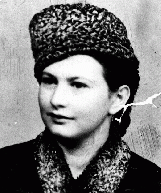
-
Erika Neuman
ID CardErika was born in Znojmo, a town in the Czech region of Moravia with a Jewish community dating back to the 13th century. Her father was a respected attorney and an ardent Zionist who hoped to immigrate with his family to Palestine. In 1931 the Neumans moved to Stanesti, a town in the Romanian province of Bukovina, where Erika's paternal grandparents lived. 1933–39: In Stanesti, Erika attended the public school as well as the Hebrew school, which her father had helped to found. She loved to play with her…
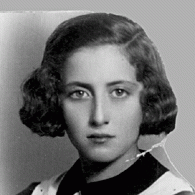
-
Moishe Menyuk
ID CardMoishe was born to a Jewish family in the village of Komarovo, which until 1918 was part of the Russian Empire. At 18, he was drafted into the Russian army and fought in World War I. He was captured by the Germans, and while a POW, learned German. After the war he returned to Komarovo, which by then was part of Poland. He supported his family by farming and managing an estate for a Pole from Warsaw. 1933-39: The few Jews of Komarovo got along well with the Ukrainians. Moishe even played the fiddle at…
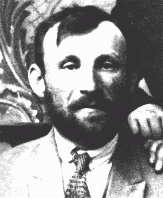
-
Miso Vogel
ID CardMiso came from a religious family in a small village in Slovakia, where his father was a cattle dealer. He was the eldest of five children. When Miso was 6 his family moved to Topol'cany, where the children could attend a Jewish school. Antisemitism was prevalent in Topol'cany. When Miso played soccer, it was always the Catholics versus the Jews. 1933-39: In 1936 Miso had his bar mitzvah and was considered a man. His grandparents traveled 50 miles for it; he was so happy they were all together. In March…
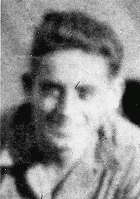
-
Zofia Rapaport
ID CardZofia was born to a Jewish family in Warsaw. Zofia's father, a self-made man who had put himself through university, was a successful banker. The Rapaports lived on a street of single-family homes with gardens. Zofia's room was decorated with yellow lacquered furniture. 1933-39: As a young child, Zofia loved to play with her dog, Chapek. Sometimes she got to go shopping with her mother downtown. Each year during the Jewish holiday of Passover her family visited Zofia's grandparents in Lvov. In late August…
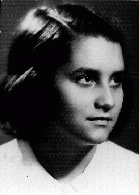
-
Chaim Werzbe
ID CardChaim was raised in a Yiddish-speaking, religious Jewish family in Sokolow Podlaski, a manufacturing town in central Poland with a large Jewish community of about 5,000. The economic activities of most of the townspeople were closely tied to those of nearby Warsaw and surrounding farming communities. As a young man, Chaim liked to play chess and was active in a local Zionist organization. 1933-39: Chaim made a living in the grain business. After settling down, he married a widow who was older than he and…
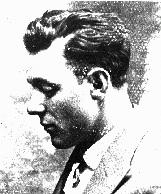
-
Yosel Coller
ID CardOne of six children, Yosel was raised in a religious Jewish family in Lodz, an industrial city in western Poland. His father was a businessman. At the age of 6, Yosel began attending a Jewish day school. His two older sisters attended public school in the morning and religious school in the afternoon. Yosel spent much of his free time playing soccer with his brothers. 1933-39: Yosel's family lived in a modest house in the northern section of Lodz. He went to a Jewish day school and had many friends there.…
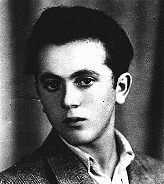
-
Renate Guttmann
ID CardRenate, her twin brother, Rene, and their German-Jewish parents lived in Prague. Shortly before the twins were born, Renate's parents had fled Dresden, Germany, to escape the Nazi government's policies against Jews. Before leaving Germany to live in Czechoslovakia, Renate's father, Herbert, worked in the import-export business. Her mother, Ita, was an accountant. 1933-39: Renate's family lived in a six-story apartment building along the #22 trolley line in Prague. A long, steep flight of stairs led up to…
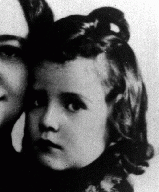
-
Lidia Lebowitz
ID CardThe younger of two sisters, Lidia was born to Jewish parents living in Sarospatak, a small town in northeastern Hungary. Lidia's parents owned a successful dry goods business. At the time, ready-made clothes were still rare in the countryside. Townspeople and local farmers would purchase fabric at the Lebowitz store and then take it to their tailor or seamstress to be sewn into clothes. 1933-39: Lidia was 2 when her Aunt Sadie, who had immigrated to the United States many years earlier, came to visit…
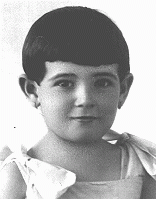
-
Rene Guttmann
ID CardRene, his twin sister, Renate, and their German-Jewish parents lived in Prague. Shortly before the twins were born, Rene's parents had fled Dresden, Germany, to escape the Nazi government's policies against Jews. Before leaving Germany to live in Czechoslovakia, Rene's father, Herbert, had worked in the import-export business. His mother, Ita, was an accountant. 1933-39: Rene's family lived in a six-story apartment building along the #22 trolley line in Prague. A long, steep flight of stairs led up to…
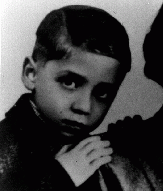
-
Pinchas Gerszonowicz
ID CardPinchas was born into a large family living in the town of Miechow in south central Poland. His father was a machinist and locksmith. Pinchas spent long days studying, either learning Hebrew in the Jewish school or taking general subjects at the public school. He belonged to the Zionist youth organization, Ha Shomer ha-Tsa'ir, and played left wing for a Jewish soccer team. 1933-39: At 13 Pinchas finished school and started work as an apprentice machinist and blacksmith in a building contractor's shop.…
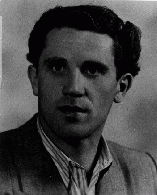
-
Hersh Gordon
ID CardHersh was born to a Jewish family in Kovno, the capital of independent Lithuania. Hersh's father was a mechanic in a textile factory, and his mother had worked as a hat designer until he was born. The Gordons lived on the first floor of Hersh's grandfather's apartment building. Eight-year-old Hersh was in the third grade at public elementary school. 1933-39: In the summers Hersh and his mother would go to his Aunt Ettel and Uncle Abraham in a small town not far away. They'd take a boat down the river to…
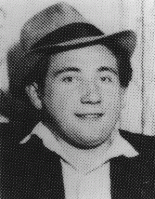
-
Rachel Saleschutz
ID CardRachel was the eighth child born to Hasidic Jewish parents living in Kolbuszowa. She spoke English, Hebrew and German in addition to Polish and Yiddish. At school, Rachel's beautiful singing voice earned her leading roles in plays even though Jewish children were rarely given parts. Rachel and her brother Naftali were active in a Zionist scout organization called Ha-No'ar ha-Zioni. 1933-39: In 1933 Rachel started writing weekly postcards to her brother in Palestine. When the cards arrived, immigrants from…
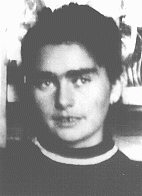
-
Leif Donde
ID CardLeif was born to a Jewish family in the Danish capital of Copenhagen. Both of his parents were active in the Jewish community there, and his father owned a small garment factory. The majority of Denmark's 6,000 Jews lived in Copenhagen before the war. Despite its size, the city's Jewish population supported many Jewish organizations, often aiding Jewish refugees from all over Europe. 1933-39: Leif went to a Jewish nursery school, which was next to a girls' school in Copenhagen. He didn't like his school…
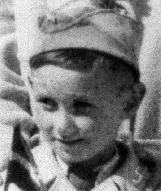
-
Simone Arnold
ID CardSimone was born in the Alsatian village of Husseren-Wesserling. In 1933 when she was three, her parents moved to the nearby city of Mulhouse. There, her father worked in a printing factory. Her parents were Jehovah's Witnesses and instilled in her the teachings of the faith. Above all, she was taught the importance of placing obedience to God before allegiance to any earthly authority. 1933-39: Simone grew up in a home full of love. Her parents would read the Bible to her. Their life included music, art,…
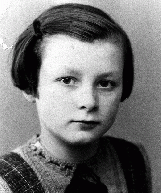
-
Renee Schwalb
ID CardVienna, home to some 175,000 Jews before World War II, was a major center of European Jewry. Vienna was also the intellectual heart of the Palestine resettlement movement. Most of the city's Jews lived in two large districts on the east side of the Danube Canal. Renee's father owned a prosperous men's clothing store in the city. 1933-39: German forces occupied Austria in March 1938. Anti-Jewish measures were quickly imposed. Renee's father was prohibited from doing business and his store was seized. He…
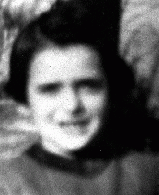
-
Judith Margareth Konijn
ID CardJudith was the younger of two children born to religious, middle-class Jewish parents. Judith's mother, Clara, was Sephardic, a descendant of Jews who had been expelled from Spain in 1492. Her father, Lodewijk, was a traveling representative for a firm based in Amsterdam. The family lived in an apartment in a new section of Amsterdam on the southern outskirts. 1933-39: Judith attended grade school with her cousin Hetty who was the same age. Judith loved to study. Her mother taught piano to students who…
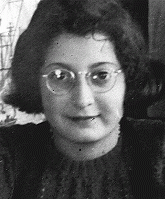
-
Ruth Singer
ID CardRuth was the only child of a Jewish family in the German town of Gleiwitz, near the Polish border. She attended public school until the fourth grade, when she transferred to a private Catholic school. Twice a week Ruth attended religious school in the afternoons. One of her favorite pastimes was playing table tennis. 1933-39: Ruth's father was born in Poland and the Nazi government considered him a Polish citizen. In October 1938 the Nazis expelled Polish Jews from Germany, allowing each deportee to leave…
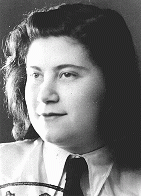
-
Mendel Felman
ID CardOne of seven children, Mendel was raised in a Yiddish-speaking, religious Jewish home in Sokolow Podlaski, a manufacturing town in central Poland with a large Jewish population of about 5,000. Mendel's parents ran a grain business. As a teenager, Mendel liked to play chess, and he completed his public schooling in Sokolow Podlaski in 1931. 1933-39: After finishing middle school, Mendel went to work in his parents' business. When he was 18, he fell in love with Frieda Altman who was in the same Zionist…
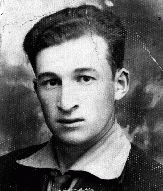
-
Sophie Weisz
ID CardSophie was born to a prosperous Jewish family in a village near the Hungarian border known for its winemaking and carriage wheel industries. The village had many Jewish merchants. Her father owned a lumber yard. Sophie loved to dance in the large living room of their home as her older sister, Agnes, played the piano. 1933-39: Sophie's father believed in a Jewish homeland and sent money to Palestine to plant trees and establish settlements there. When she was 10, she was sent to a school in nearby Oradea…
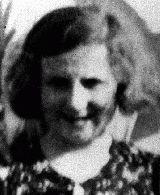
-
Miru Alcana
ID CardMiru was the youngest of four children born to a family of Spanish-Jewish descent on the island of Rhodes. Rhodes had been occupied by Italy since 1912, so Miru learned Italian as well as French at school. At home the Alcana family conversed in Ladino, the Spanish-Jewish language. Miru attended a Jewish school, where she received instruction in Hebrew three times a week. 1933-39: Life on Miru's beautiful island was pleasant and the Alcanas were close with their neighbors. She called them Auntie Rivka and…
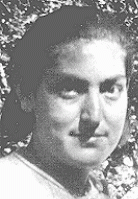
-
Herschel Gerszonowicz
ID CardThe fourth of eight children, Herschel was born to Jewish parents in south central Poland. His father was a machinist and locksmith. Herschel belonged to the Zionist youth organization, Ha Shomer ha-Tsa'ir, and played soccer for the Jewish team. When he was 14 years old, he left school to become apprenticed to his stepsister's father who was a tailor. 1933-39: Herschel was working as a tailor in Miechow when, on September 1, 1939, the German army invaded Poland. His parents decided that he and his…
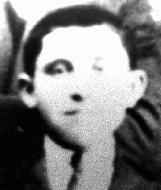
-
Susanne Ledermann
ID CardSusanne was the younger of two daughters born to Jewish parents in the German capital of Berlin. Her father was a successful lawyer. Known affectionately as Sanne, Susanne liked to play with her sister on the veranda of her home and enjoyed visiting the Berlin Zoo and park with her family. 1933-39: After the Nazis came to power in January 1933, it became illegal for Jewish lawyers to have non-Jewish clients. When Susanne was 4, her father's law practice closed down and the Ledermanns moved to the…
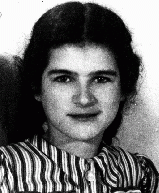
-
Idzia Pienknawiesz
ID CardIdzia was the older of two girls born to Jewish parents who lived 35 miles east of Warsaw in the small predominantly Jewish town of Kaluszyn. Idzia's father owned a liquor store and her mother was a housewife. Idzia was close friends with a group of Jewish teenagers who went to the same public school and spent much of their free time and vacations together. 1933-39: Normally, Idzia goes out with her friends on pleasant summer evenings. They like to stroll down the main street together and visit the sweets…
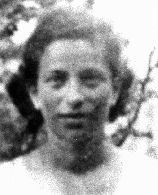
-
Ruth Gabriele Silten
ID CardGabriele was the only child of Jewish parents living in the German capital of Berlin. Her grandfather owned a pharmacy and a pharmaceuticals factory, where Gabriele's father also made his living. 1933-39: In 1938 the Nazis forced Ruth's grandfather to sell his factory and pharmacy for very little money to an "Aryan" German. After that, her father decided they should move to Amsterdam where it was safer for Jews. She was 5 years old and wanted to stay in Berlin. She didn't understand why she had to leave…
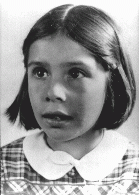
-
Arlette Waldmann
ID CardArlette's Russian-Jewish mother and Romanian-Jewish father had studied medicine together in Paris. After finishing medical school, they married and decided to set up practice in Broncourt, a farming village of 300 inhabitants in northern France. 1933-39: Arlette's father was an old-fashioned doctor who made housecalls, by bicycle at first, then on a motorcycle, and finally, in a car. His patients looked forward to seeing him and held him in high esteem, always offering him coffee and schnapps. Even after…
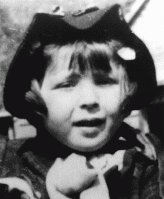
-
Wolf Himmelfarb
ID CardWolf was the eldest of three children born to Yiddish-speaking, religious Jewish parents in Koprzewnica, a small town in southern Poland. His father ran a grocery store, where his mother would help out on Thursdays. The store was located in the house of Wolf's grandmother, and Wolf, his brother, Izik, and sister, Chana, would play in a large yard in the back. 1933-39: Wolf started attending school a year late, at 8, so that he and his younger brother could share the same books. In the third grade, Jewish…
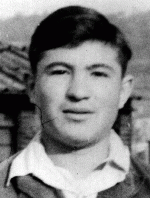
-
Leo Falkenstein
ID CardOne of three children, Leo grew up in the small town of Hochneukirch, 20 miles northwest of Cologne. As an adult, Leo entered his father's cigar manufacturing business, "Isak Falkenstein and Sons." Leo and his wife, Bertha, lived in a house next to Leo's parents. Leo and Bertha had six children whom they raised in the Jewish faith. 1933-39: Leo and Bertha's daughter Johanna has brought her two girls to live with them for a while here in Hochneukirch. Johanna's husband, Carl, has been having trouble…
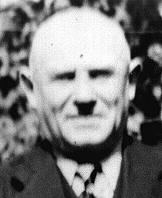
-
Bertha Falkenstein
ID CardOne of two children, Bertha grew up in the small village of Bergheim where her father was a farmer. After she married Leo Falkenstein, the couple settled in Hochneukirch, 20 miles northwest of Cologne. There her husband was employed in his father's cigar manufacturing business, "Isak Falkenstein and Sons." Bertha and Leo had six children whom they raised in the Jewish faith. 1933-39: In 1937 Bertha's daughter Johanna brought her two girls to live briefly with them in Hochneukirch. Johanna's husband, Carl,…
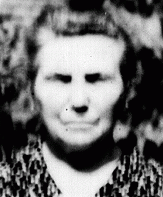
-
Moishe Rafilovich
ID CardMoishe was one of three sons born to Yiddish-speaking Jewish parents in Radom. This industrial city was known for its armaments factories, in which Jews were not allowed to work even though they totaled more than one-fourth of the city's population. When Moishe was young, he left school to apprentice as a women's tailor and eventually became a licensed tailor. He also played soccer for a local team. 1933-39: In 1937 Moishe, by then a master tailor, married another tailor's daughter. The couple had two…
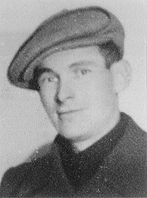
-
Erika Eckstut
ArticleExplore Erika Eckstut's biography and learn about the difficulties and dangers she faced in the Czernowitz ghetto.

-
The "We Will Never Die" Pageant
Article"We Will Never Die" was a 1943 musical stage performance that raised awareness among Americans about the murder of European Jews. Learn more.
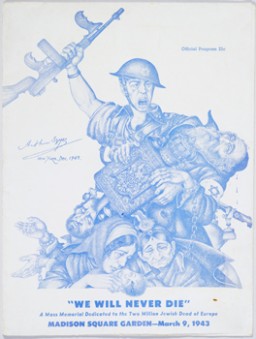
-
Battle of Britain
FilmAfter the defeat of France in June 1940, Germany moved to gain air superiority over Great Britain as a prelude to an invasion of Britain. Despite months of air attacks, Germany was not able to destroy Britain's Royal Air Force (RAF). In the fall of 1940, the invasion was indefinitely postponed. The German bombing campaign against Britain continued until May 1941. The Germans ultimately halted the air attacks primarily because of preparations for the invasion of the Soviet Union in June 1941.
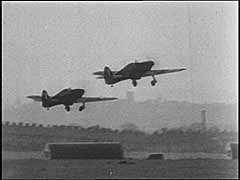
-
Leo Melamed describes going to school in prewar Bialystok
Oral HistoryLeo was seven years old when Germany invaded Poland in September 1939. Before the war, Leo's father was a mathematics teacher and member of the Bialystok City Council. Fearing arrest, Leo's father fled Bialystok for Vilna just before the German occupation. Leo and his mother eventually joined his father in Vilna. After the Soviets occupied Vilna, Leo's father obtained transit visas to Japan. The family left Vilna in December 1940, traveled across the Soviet Union on the Trans-Siberian Express, and arrived…
